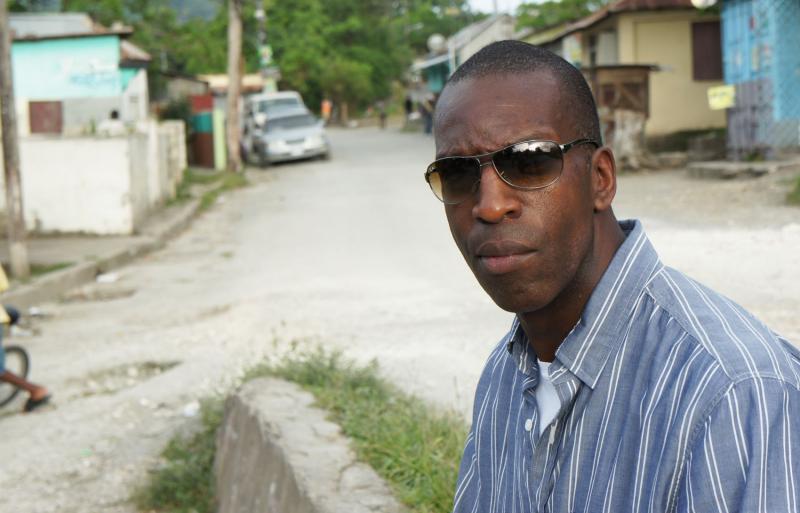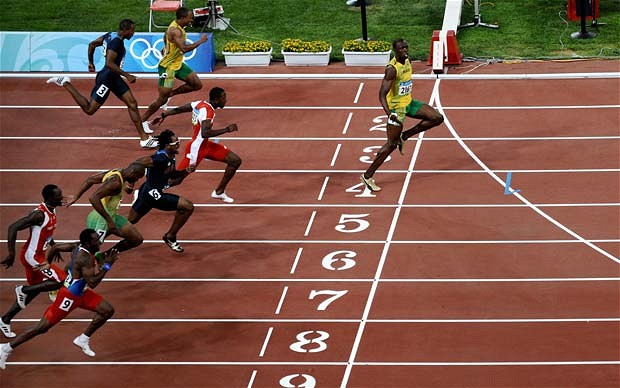Michael Johnson: Survival of the Fastest, C4 | reviews, news & interviews
Michael Johnson: Survival of the Fastest, C4
Michael Johnson: Survival of the Fastest, C4
Controversial subject handled deftly

What a dicey subject for debate Michael Johnson opened here, one that has scuppered the career of academics and social commentators alike, and which will have made many of his audience feeling deeply troubled. Johnson, now 44, competed at three Olympic Games between 1992 and 2000, won four Olympic gold medals at 200 metres and 400 metres, and still holds the world record for the latter.
The starting point was his realisation that, at the Beijing Games in 2008, the eight sprinters who lined up for the men's 100m final, who hailed from four countries, were all descended from West Africans by way of the slave trade; two were African Americans, three from Jamaica, two from Trinidad and Tobago and one, a Dutchman, was born on the former empire island of Curacao (Usain Bolt winning pictured below).
One young Jamaican sprinter put her country's athletic success down to eating bananas and yams
Did being descended from slaves somehow give these men a genetically inherited advantage? The argument goes that only the fittest Africans were in the first instance chosen by the slave traders to be sent on the slave ships; only the fittest of those survived the appallingly inhumane conditions across the Atlantic (in which in some cases less than 10 per cent of the human “cargo” made it to the New World); and then only the strongest were bought at market; and to add to the long list of astonishing indignities bestowed upon these people, slave owners would make their strongest male and female slaves “mate” to produce the next generation of sturdy workers. Thus, the argument goes, descendants of slaves have inherited some tremendously strong genes and, in the case of men, a discernibly higher level of testosterone.
Wowser. If true, it's a very contentious argument that plays straight into the black brawn/white brains view of race. It has some seemingly straightforward facts to support it: while East Africans regularly win medals in long-distance events (which science can easily explain due to physical type, diet and climate), West Africans don't win sprint medals, but their descendants do. It's particularly noticeable in the case of Jamaica which, despite its tiny population and scarce economic resources, punches well above its weight in athletics terms; it won five gold medals in the men's and women's sprints in Beijing, when Bolt and Shelley-Ann Fraser-Pryce breasted the tape first in their 100 metres events.
 Johnson's case was made persuasively enough. He spoke to several academics, who talked about a survival gene and another who explained how we can learn from elephant seals, a species almost extinct a short while ago that has since, with more than a little help from conservationists, recovered to become stronger, bigger and fitter. Cataclysmic events can sometimes be useful in evolution, the expert said, and what could be more cataclysmic for humans than slavery?
Johnson's case was made persuasively enough. He spoke to several academics, who talked about a survival gene and another who explained how we can learn from elephant seals, a species almost extinct a short while ago that has since, with more than a little help from conservationists, recovered to become stronger, bigger and fitter. Cataclysmic events can sometimes be useful in evolution, the expert said, and what could be more cataclysmic for humans than slavery?
In the film we saw Johnson trace his Texan family, Who Do You Think You Are-style, back to its slave origins, and through a DNA test back to Senegal. I find it unlikely that he hasn't traced his family before and that he didn't know he was descended from slaves, nor that he was of West African descent, but no matter, this was a bit of business in an otherwise interesting film. When he presented his findings about his ancestors to his siblings we got to see that they were in no way athletic and clearly enjoyed a glass or several at their jolly family gatherings. It made the subtle point that genes are not everything - things such as determination, hard work, ambition, practice and talent also have a lot to do with sporting success. A scientist also noted that other, negative, things appear to have been inherited by African Americans, such as higher rates of prostate cancer and diabetes, both of which members of Johnson's family have suffered.
A lighter moment was provided when Johnson went to Jamaica and one of the young sprinters he spoke to put her country's athletic success down to eating bananas and yams, although her male colleague thought it was about black athletes trying to prove they were as good as whites. A better investigator would have questioned him more, but the statement was left hanging. An interesting factoid at this point: Usain Bolt comes from Trelawny parish in Jamaica, the same district where Olympic chairman Sebastian Coe's ancestors once owned plantations. Funny old world, innit?
Two things were missing from this programme, enjoyable though it was - any real science beyond academics positing a view, and a counter argument. But as we wait to see next month if Usain Bolt can be the first man since Carl Lewis to defend his 100-metre Olympic title successfully, as Johnson said about his film, I hope it at least provokes some thought.
Explore topics
Share this article
Add comment
The future of Arts Journalism
You can stop theartsdesk.com closing!
We urgently need financing to survive. Our fundraising drive has thus far raised £49,000 but we need to reach £100,000 or we will be forced to close. Please contribute here: https://gofund.me/c3f6033d
And if you can forward this information to anyone who might assist, we’d be grateful.

Subscribe to theartsdesk.com
Thank you for continuing to read our work on theartsdesk.com. For unlimited access to every article in its entirety, including our archive of more than 15,000 pieces, we're asking for £5 per month or £40 per year. We feel it's a very good deal, and hope you do too.
To take a subscription now simply click here.
And if you're looking for that extra gift for a friend or family member, why not treat them to a theartsdesk.com gift subscription?
more TV
 The Diplomat, Season 3, Netflix review - Ambassador Kate Wyler becomes America's Second Lady
Soapy transatlantic political drama keeps the Special Relationship alive
The Diplomat, Season 3, Netflix review - Ambassador Kate Wyler becomes America's Second Lady
Soapy transatlantic political drama keeps the Special Relationship alive
 The Perfect Neighbor, Netflix review - Florida found-footage documentary is a harrowing watch
Sundance winner chronicles a death that should have been prevented
The Perfect Neighbor, Netflix review - Florida found-footage documentary is a harrowing watch
Sundance winner chronicles a death that should have been prevented
 Murder Before Evensong, Acorn TV review - death comes to the picturesque village of Champton
The Rev Richard Coles's sleuthing cleric hits the screen
Murder Before Evensong, Acorn TV review - death comes to the picturesque village of Champton
The Rev Richard Coles's sleuthing cleric hits the screen
 Black Rabbit, Netflix review - grime and punishment in New York City
Jude Law and Jason Bateman tread the thin line between love and hate
Black Rabbit, Netflix review - grime and punishment in New York City
Jude Law and Jason Bateman tread the thin line between love and hate
 The Hack, ITV review - plodding anatomy of twin UK scandals
Jack Thorne's skill can't disguise the bagginess of his double-headed material
The Hack, ITV review - plodding anatomy of twin UK scandals
Jack Thorne's skill can't disguise the bagginess of his double-headed material
 Slow Horses, Series 5, Apple TV+ review - terror, trauma and impeccable comic timing
Jackson Lamb's band of MI5 misfits continues to fascinate and amuse
Slow Horses, Series 5, Apple TV+ review - terror, trauma and impeccable comic timing
Jackson Lamb's band of MI5 misfits continues to fascinate and amuse
 Coldwater, ITV1 review - horror and black comedy in the Highlands
Superb cast lights up David Ireland's cunning thriller
Coldwater, ITV1 review - horror and black comedy in the Highlands
Superb cast lights up David Ireland's cunning thriller
 Blu-ray: The Sweeney - Series One
Influential and entertaining 1970s police drama, handsomely restored
Blu-ray: The Sweeney - Series One
Influential and entertaining 1970s police drama, handsomely restored
 I Fought the Law, ITVX review - how an 800-year-old law was challenged and changed
Sheridan Smith's raw performance dominates ITV's new docudrama about injustice
I Fought the Law, ITVX review - how an 800-year-old law was challenged and changed
Sheridan Smith's raw performance dominates ITV's new docudrama about injustice
 The Paper, Sky Max review - a spinoff of the US Office worth waiting 20 years for
Perfectly judged recycling of the original's key elements, with a star turn at its heart
The Paper, Sky Max review - a spinoff of the US Office worth waiting 20 years for
Perfectly judged recycling of the original's key elements, with a star turn at its heart
 The Guest, BBC One review - be careful what you wish for
A terrific Eve Myles stars in addictive Welsh mystery
The Guest, BBC One review - be careful what you wish for
A terrific Eve Myles stars in addictive Welsh mystery
 theartsdesk Q&A: Suranne Jones on 'Hostage', power pants and politics
The star and producer talks about taking on the role of Prime Minister, wearing high heels and living in the public eye
theartsdesk Q&A: Suranne Jones on 'Hostage', power pants and politics
The star and producer talks about taking on the role of Prime Minister, wearing high heels and living in the public eye

Comments
Survival of the fittest was a
Nonsense. It is about
I agree, i have watched every